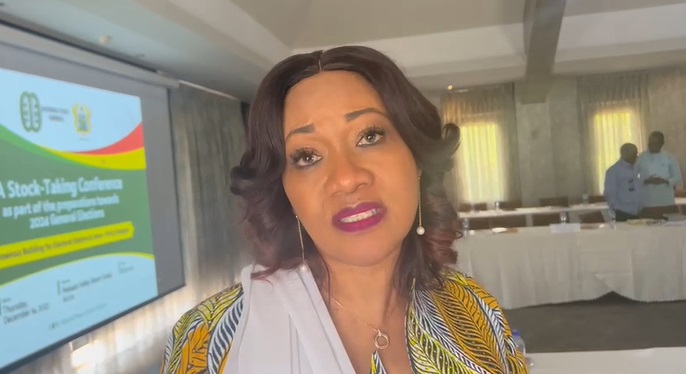
EC to upload pink sheets on online portal
The Electoral Commission (EC) has outlined plans to upload the summary of results sheets (pink sheets) on a dedicated online portal during the 2024 general election.
Pink sheets are the EC’s official documents used to collate results of elections at polling stations, constituency and regional levels and are the source documents which the commission relies on to declare Members of Parliament (MPs) and the President as elected.
The Chairperson of the EC, Jean Mensa, who disclosed this yesterday at a stakeholder conference on election reforms and political dialogue at Peduase, near Aburi in the Eastern Region, said the move was part of a raft of reforms by the EC to promote transparency in the polls.
She said the EC had decided to improve on its previous reforms which led to the release of the results of 2020 general election within 48 hours of the polls by uploading all the scanned pink sheets on the portal.
“This time around, we plan to display the scanned signed pink sheets on a dedicated portal.
We are confident that this arrangement will promote transparency and engender further trust and confidence in our electoral processes.
By so doing, we will also promote inclusion and involve the citizens throughout the process,” Mrs Mensa said.
Organised by the National Peace Council (NPC), in collaboration with the International Republican Institute (IRI) with funding from the USAID, the conference was a sequel to a national dialogue in July 2021 by the NPC which brought all the major stakeholders together to promote political tolerance and ensure transparent, free, fair and peaceful elections.
Dubbed “Stock-Taking Conference as Part of the Preparations towards 2024 Elections,” the conference was attended by people from political parties, the judiciary, civil society organisations, the EC, constitutional bodies and security agencies.
Notable personalities at the conference included a Justice of the Supreme Court, Justice Yonny Kulendi, Deputy Chairpersons – Dr Bossman Asare and Samuel Tettey; the Chairperson of the National Commission for Civic Education (NCCE), Kathleen Addy, and the Chairman of the NPC, Rev. Dr Ernest Adu Gyamfi.
Others included the National Chairman of the National Democratic Congress, Johnson Asiedu Nketiah, the General Secretary of the NDC, Fifi Kwetey, and leaders from other political parties.
Other reforms
Mrs Mensa further announced plans by the EC to reduce filing fees by 30 per cent for women and persons with disability aspiring to be MPs to encourage such persons to get more involved with the governance process.
“We hope that this will encourage more women to vie for public office and hopefully lead to an increase in the number of women MPs.
Currently, women in Parliament constitute a low 14.5 per cent of the number of MPs,” she said.
Another new reform for the 2024 elections, she said, was a proposal to close voting at 3 p.m. instead of the normal 5 p.m. to help with the early counting of the votes.
The EC chairperson said the new reforms would be implemented with other reforms such as the increase in the number of polling stations and the reduction of the number of voters to each polling station to around 500 voters to reduce congestion at polling stations for counting to begin early.
Mrs Mensa, however, disclosed that the fact that voting would end at 3 p.m. did not mean that a voter in a queue at 3 p.m. would not be allowed to vote.
“We are convinced that closing the polls at 3 p.m. will enable counting and collating to take place in broad daylight and promote the needed transparency and orderliness we so desire,” the EC Chair added.
Justice Kulendi called for reforms to reduce delays in adjudication of electoral disputes, especially regarding parliamentary disputes, stating that such reforms would enhance the country’s democratic dispensation.
He gave an example of the 2000 Wulensi Parliamentary election dispute which took over two years to be determined finally, by which time the ineligible MP who was ordered to vacate the seat had illegally occupied the seat for 26 months.
As part of such reforms, Justice Kulendi suggested that elections could be held in November to allow for more time for disputes to be resolved before a government was sworn into office.
Again, he called for a change in the rules of court to enable parliamentary election petitions to be resolved within a certain time frame as pertained in presidential election petitions.
Warning signs
For his part, Rev. Dr Adu Gyamfi said although the country had successfully organised many elections without any serious social upheavals, there was no room for complacency in next year’s general election.
“We cannot ignore warning signs that are within our reach and ability to address.
It’s our conviction that if all the players in the electoral process conduct their activities, mindful of the key elements of good governance and peace, Ghana will probably have one of the best elections ever undertaken in Africa,” the NPC chairman said.
Writer’s email:
